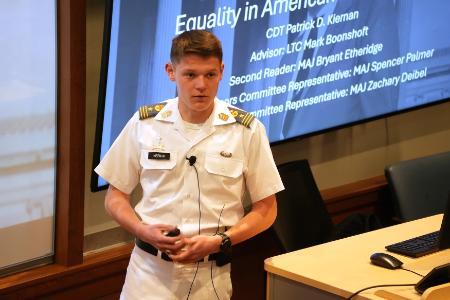Honors Week: Exploring the Complexities of Desegregation

LEXINGTON, Va. April 14, 2025 — Patrick Kiernan ’25 started exploring different civil rights cases at the Supreme Court level during a class in high school. He found it interesting to see how different cases were and how civil rights progressed.
Jumping forward to his time at Virginia Military Institute, he started exploring more education-based civil rights cases. His interest then formed into a plan for this honors thesis, “The Courts and Educational Equality: The History of the Court's Role in Desegregation, Integration, and Equality in American Public Schools,” which he presented during VMI Honors Week. 
His thesis was centered on the enforcement of desegregation post-Brown v. Board of Education, focusing on the 1960s and 1970s. Divided into five key Supreme Court cases, Kiernan explored the complexities of desegregation, focusing on: Griffin v. Prince Edward County, Swann v. Charlotte-Mecklenburg, Milliken v. Bradley, San Antonio v. Rodriguez, and Regents of the University of California v. Bakke.
"Overall, I was trying to look at the challenges of desegregating,” he explained. “The way it's taught in schools is that it was almost overnight. There was more going in, it was a lot more complicated. I was looking at what made it so complicated and what made it difficult to desegregate and all the other problems that kind of came with it.”
Kiernan dedicated between three to seven hours a week to reading, research, and writing in order to tackle a 70-page paper.
“I think it’s helped me develop my writing skills a bit more, because I’ve been able to write that long and able to make it more of a coherent thing,” he said. “Because, even with some of my other classes where it's like a five- paragraph essay, it's easy to keep it coherent when it's that short. But when you're trying to navigate something that's almost the size of a small book, it takes a lot more thought and care to be able to put that all together.”
Lt. Col. Mark Boonshoft, associate professor in the Department of History, was Kiernan’s academic advisor for his thesis. The history department requires a longer thesis and additional preparatory semester of work during a cadet’s 2nd Class year, Boonshoft explained.
Boonshoft started working with Kiernan last spring with an independent study, where Kiernan studied school desegregation as it relates to courts specifically. Through that, the two refined Kiernan’s topic to identify primary sources, settle on research methods, and discuss writing.
“Compared with other disciplines, history requires a lot of independence in research for undergraduates,” Boonshoft said. “Cadet Kiernan's project is on a subject I know a lot about from teaching it for years, but it is not something on which I have done independent research. I am not reading the hundreds of pages of primary sources from Supreme Court justices’ private papers that Cadet Kiernan is. I can keep tabs on his work, look at his notes, review drafts frequently, discuss the research weekly, but this is not collaborative research. Cadet Kiernan deserves the credit for having produced 70 -pages of carefully researched, well-sourced, original work.”
Kiernan said that the process of research and writing his thesis sparked new ambitions for him. He previously had an interest in law school, but this experience has prompted him to shift to potentially graduate school. Although Kiernan will be commissioning into the U.S. Army after graduating in May, he said the future prospect of grad school has become more alluring.
As part of the Institute Honors program, the history major said it’s allowed him to explore other concentrations and widen his academic discoveries. He said it’s made him more intellectually curious.
"If you really want to learn more about the world in general, I think Institute Honors has helped,” Kiernan admitted. "I've been able to learn a lot, even if it wasn't necessarily something in my discipline.”
Boonshoft said that Kiernan’s research will help him when he commissions into the Army. He said that constitutional history has become an area of focus at VMI to help train its citizen-soldiers.
"Research like this brings important constitutional issues to cadets' attention. It's research that also bears on VMI's own story of racial integration in the 1960s, of affirmative action, and so forth,” Boonshoft said. “I think this research shows his commitment to the citizenship side of the citizen-soldier ideal. More concretely, it has given him a chance to hone important skills of analysis, of writing, and most importantly of formulating clear questions and strategizing ways to answer them. He has also had to synthesize huge amounts of information into a coherent narrative. That skill of separating what is important and what's just noise will serve him well in the military and beyond.”
Laura Peters Shapiro
Communications & Marketing
VIRGINIA MILITARY INSTITUTE
.svg)
.png)